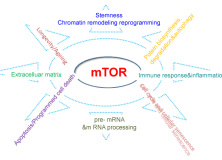
Exercise is the greatest physiological stress that our bodies experience. For example, during maximal endurance exercise in elite athlete’s cardiac output can increase up to 8-fold and the working muscles receive 21-times more blood each minute than at rest. Given the physiological stress associated with exercise and the adaptations that occur to handle this stress, it is not surprising that exercise training is known to prevent or effectively treat a multitude of degenerative conditions including cardiovascular disease, cancer, diabetes, depression, Alzheimer’s disease, Parkinson’s disease, and many others. Many of the health benefits of exercise are mediated by the mammalian/mechanistic target of rapamycin (mTOR), either in complex 1 or 2, not only within the working muscle, but also in distant tissues such as fat, liver, and brain. This review will discuss how exercise activates mTOR in diverse tissues and the ways that mTOR is important in the adaptive response that makes us bigger, stronger, and healthier as a result of exercise.
Semin Cell Dev Biol. 2014 Dec;36:130-9. doi: 10.1016/j.semcdb.2014.08.013. Epub 2014 Sep 16.


